Anal fissures: Symptoms, causes, and treatment options
- Reviewed by Lawrence S. Friedman, MD, Contributor; Editorial Advisory Board Member, Harvard Health Publishing

The anal canal makes up the last two to three inches of the rectum, which is the final section of the large intestine. A tear in the anal canal is called an anal fissure. Fissures are sometimes confused with hemorrhoids, which have similar symptoms but do not involve tears. Anal fissures are often painful but usually heal without medical intervention.
What is an anal fissure?
An anal fissure is a small tear in the lining of the anal canal. Anal fissures are typically caused by constipation and straining to pass hard stools. They can also result from diarrhea, vaginal childbirth, or infections.
Anal fissure symptoms
Symptoms of an anal fissure include:
- sharp pain brought on by a bowel movement. The pain can last for as long as a few hours and radiate to the lower back, thighs, and buttocks.
- itching around the anus, the opening at the end of the anal canal where stool passes out of the body
- a muscle spasm in the anus
- bright red blood in the feces, which may be seen on toilet paper after a bowel movement
- a small lump or skin tag on the skin near the anus (this is more common in chronic cases).
Anal fissure or hemorrhoids?
Anal fissures and hemorrhoids have similar symptoms. But unlike fissures, hemorrhoids are not tears. Hemorrhoids are swollen and inflamed veins (known as anal cushions) that can occur externally (around the outside of the anus) or internally, inside the lower rectum.
Anal fissure causes
The most common causes of anal fissures are constipation and diarrhea. Other circumstances can also lead to anal fissues.
Constipation
Constipation can cause you to strain to have a bowel movement. This, along with passing hard stools, can result in a fissure.
Diarrhea
Diarrhea is more acidic than normal stool and can irritate and inflame the area around the anus, making it vulnerable to tearing. Diarrhea can also cause you to poop more frequently, which further irritates the area.
Other causes of anal fissures include having a tight anal sphincter muscle, inflammatory bowel disease, trauma to the anus, anal intercourse, vaginal childbirth, infections in the area of the anus, and, rarely, tumors.
Acute versus chronic anal fissures
Anal fissures can be a short-term (acute) problem or they can be chronic, lasting for several weeks or longer.
People with chronic fissures may resist pooping to avoid the pain. This can cause or worsen constipation, which just makes the problem worse. Chronic fissures may require surgical treatment.
Anal fissure treatment: From self-care to medical interventions
In most cases, an anal fissure will heal on its own or with self-care measures that can be done at home. In the case of a chronic fissure, topical medications or medical procedures may be necessary.
Treatment options for anal fissures include the following:
Self-care measures
- sitz baths, in which you immerse the affected area in warm water by sitting in a bathtub, sometimes with added Epsom salts, for 10 to 20 minutes a few times a day
- over-the-counter stool softeners, which help make stools easier to pass
- eating a high-fiber diet, or taking fiber supplements such as Metamucil.
Medications
- lidocaine ointment, available over the counter and by prescription, applied to the anus for pain relief
- ointments containing diltiazem, nifedipine, or nitroglycerin, to relax the anal sphincter muscles and promote healing
Medical procedures
- injections of botulinum toxin (Botox) into the anal sphincter to block pain signals
- lateral internal sphincterotomy, in which a small section of the anal sphincter muscle is cut. This procedure helps to relieve pain and promote healing of the fissure.
When to see a doctor for anal fissures
If you have an anal fissure that has lasted for more than a few weeks and is not responding to self-care measures, consult your doctor for advice.
Preventing anal fissures: Lifestyle and dietary changes
To prevent anal fissures from forming, it's best to try to head off constipation and diarrhea — the two leading causes of anal fissure.
Eating a high-fiber diet with plenty of fruits, vegetables, and whole grains can help make your stools firm and easy to pass without straining. If you have trouble getting enough fiber from your diet, ask you doctor about taking an over-the-counter fiber supplement. Drinking water throughout the day can also prevent constipation and hard stools.
The best way to prevent diarrhea is by practicing good hygiene. For example, be sure to wash your hands with soap and water before eating, before preparing food, and after using the bathroom. Avoid foods that upset your stomach. And follow the FDA's guidelines for safe food handling.
About the Author

Christina Frank, Health Writer
About the Reviewer

Lawrence S. Friedman, MD, Contributor; Editorial Advisory Board Member, Harvard Health Publishing
Disclaimer:
As a service to our readers, Harvard Health Publishing provides access to our library of archived content. Please note the date of last review or update on all articles.
No content on this site, regardless of date, should ever be used as a substitute for direct medical advice from your doctor or other qualified clinician.















